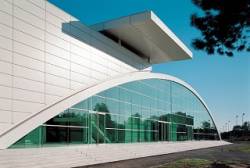
The 2015 World Congress of the International Association of Institutes of Navigation will take place at a new venue, the Corinthia Hotel, close to the well-preserved historical center of Prague, Czech Republic, on October 20 – 23, 2015. This will be the 15th meeting of all of the member organzations, who will discuss the science and practice of navigation and related technologies.
The 2015 World Congress of the International Association of Institutes of Navigation will take place at a new venue, the Corinthia Hotel, close to the well-preserved historical center of Prague, Czech Republic, on October 20 – 23, 2015. This will be the 15th meeting of all of the member organzations, who will discuss the science and practice of navigation and related technologies.
Congress chair František Vejražka, Czech Technical University, said, "Our demands on navigation, on its accuracy and reliability are rapidly growing. That is why navigation systems utilize the latest theoretical knowledge of physics and mathematics and therefore use the most advanced technologies. That is why we must monitor their latest developments. A very efficient way to do this is to meet in person!"
A preliminary list of keynote speakers and topics include the following:
Sharafat Gadimova: Satellite navigation and its future perspectives, international aspectsUnited Nations Office for Outer Space Affairs, Austria
Dorota Grejner-Brzezinska: Multi-sensor Navigation Systems: Concepts, Evolution, Trends and Applications
The Institute of Navigation & The Ohio State University, USA
Günter W. Hein: Current status and future perspectives of EGNOS and Galileo
University FAF, Munich, Germany
Satoshi Kogure: QZSS
Japan Aerospace Exploration Agency
David Last: Navigation of Navigation
Consultant Engineer and Expert Witness, United Kingdom
Jing Li: BeiDou (Compass) Navigation Satellite System Development
China Transport Telecommunication & Information Center
Harold W. Martin III: Current Status and Future Perspective of the U.S. GPS Program
National Coordination Office for Space-Based Positioning, Navigation, and Timing, USA
Terry Moore: Where next for GNSS
University of Nottingham, United Kingdom
Sergey Revnivykh: Glonass and its modernization
ISS-Reshetnev Company, Russia
Paper topics include
- Satellite Navigation Systems (GPS, GLONASS, GALILEO, BEIDOU/COMPASS, QZSS, etc.)
- Augmentation Systems (SBAS, GBAS, etc.)
- GNSS Modernization
- Signal Processing in Navigation Systems and Systems Integration
- Interference and Spectrum Management, Jamming and Spoofing
- GNSS Receivers and Antenna Technologies
- Autonomous Navigation
- MEMS, Atomic Clock and Micro PNT
- Space and Atmospheric Weather Effects on GNSS
- Aviation Applications
- Marine Applications
- Terrestrial Applications
- Urban and Indoor Applications
- Space Applications and Remote Sensing
- Precise positioning, RTK
- Radar and Alternative Sensors
Started by British, French and German Institutes of Navigation in 1957,
IAIN now consists of member organizations from all over the world. It has consultative status with the International Maritime
Organization (IMO), the ICAO, civil aviation organization, ICAO, the UN’s
International Committee on GNSS, the International Hydrographic
Organization (IHO) and the United States PNT Advisory Board. It is
presently promoting an international institutional
solution for a Global
Navigation Satellite System (GNSS) and is also encouraging the
interoperability of a navigation and communication system infrastructure for
use on land, at sea, in the air and in space.
NOTE: All non-E.U. visitors to the Czech Republic must possess a passport valid for at least the next three months. Click here for complete information about visa and passport requirements. A visa request takes about two months.





